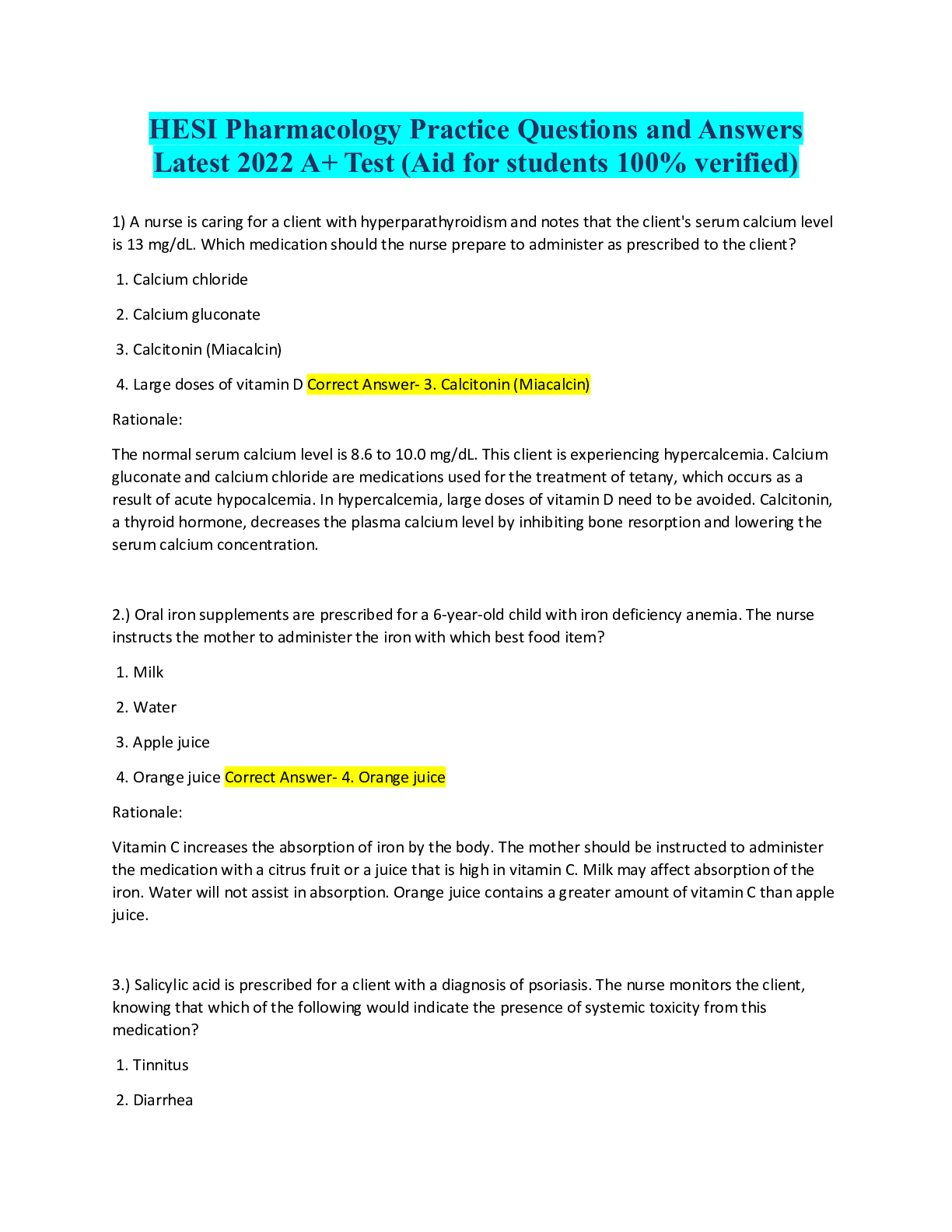*NURSING > EXAM > NURS 3003 Pharmacology Practice Questions (2020) | NURS 3003 Pharmacology Practice Questions latest (All)
NURS 3003 Pharmacology Practice Questions (2020) | NURS 3003 Pharmacology Practice Questions latest
Document Content and Description Below
NURS 3003 Pharmacology Practice Questions (2020) 180 questions and answers Pharmacology Practice Questions 1) A physician has ordered intramuscular injections of morphine, a narcotic, every... 4 hours as needed for pain for a motor vehicle accident victim. The nurse is aware that there is a high abuse potential for this drug; therefore, morphine is categorized as a Answer: Schedule II drug 2) A nurse is teaching her patient about the use of over-the-counter (OTC) drugs. Which of the following statements best informs the patient about their safe use? Answer: OTC drugs need to be taken with caution. They can mask the signs and symptoms of an underlying disease and interfere with prescription drug therapy. 3) A nurse working in radiology administers iodine to a patient who is having a computerized axial tomography (CAT) scan. A nurse working on an oncology unit administers chemotherapy to patients who have cancer. At the Public Health Department, a nurse administers a measles-mumps-rubella (MMR) vaccine to a 14-month-old child as a routine immunization. Which branch of pharmacology best describes the actions of all three nurses? Answer: Pharmacotherapeutics 4) In which of the following patients would a nurse expect to see an alteration in drug metabolism? Answer: A 50-year-old male with cirrhosis of the liver 5) During which phase of pharmacokinetics could a significant drug-drug interaction occur, resulting in one drug stimulating or blocking the metabolism of the other drug? Answer: Biotransformation 6) A nurse has been administering a drug to a patient intramuscularly (IM). The physician discontinued the IM dose and wrote an order for the drug to be given orally. The nurse notices that the oral dosage is considerably higher than the parenteral dose and understands that this is due to: Answer: First-pass effect 7) Which of the following factors affects absorption of intramuscular (IM) administration of drugs? Answer: Environmental temperature 8) A nurse is instructing her patient about a newly prescribed drug. Which of the following should be included in the teaching to help improve patient compliance and safety? Answer: Measures to alleviate any discomfort associated with adverse effects 9) A patient has been taking an oral antibiotic for 10 days. She reports to the nurse that she has developed vaginal itching and a clear discharge. The nurse is aware that the patient is experiencing which of the following? Answer: A superinfection caused by the antibiotic, which has destroyed normal flora 10) A male patient is admitted to the emergency room in distress. The nurse suspects an anaphylactic reaction from oral penicillin. Which assessment findings are important in making this diagnosis? Answer: Blood pressure: 186/100, difficulty breathing 11) Potassium-sparing diuretics can lead to potassium retention. Which assessment finding could indicate hyperkalemia? Answer: Potassium level of 5.9 mEq/L 12) A nurse has just administered a drug that can cause sedation to a 70-year-old patient. Which of the following would be the priority nursing diagnosis for this patient? Answer: Risk for injury: Related to adverse effects of the drug 13) A physician order is written for a patient to receive 500 mL of normal saline IV over 8 hours. If the IV infusion set delivers 15 drops/mL, how many drops per minute should the patient receive? Answer: 15 drops/min 14) An order is written for a patient to receive 1000 mL of normal saline IV over 8 hours. If the IV infusion set is a microdrip set that delivers 60 drops/mL, how many drops per minute should the patient be receiving? Answer: 125 drops/min 15) A patient who has migraine headaches has received a new prescription for a triptan, and the nurse has completed teaching related to the drug. Which of the following statements would indicate that the patient has a clear understanding of the new drug? Answer: I should not experience as many adverse effects from my new medication 16) A nurse is caring for a 10-year-old who has complained of chronic headaches. His mother reports that she gives him Tylenol at least twice a day. Which of the following will the nurse evaluate? Answer: Hepatic function 17) A 55-year-old patient has been diagnosed with osteoarthritis of the hands and feet. Choline salicylate (Arthropan) is prescribed for him. He reports to the nurse that he has had a decrease in appetite for 2 weeks and has experienced some nausea. Which of the following would be an appropriate nursing diagnosis for this patient? Answer: Imbalanced nutrition: Less than body requirements 18) The nurse should exercise caution when administering antimetabolites to a patient with Answer: Bone marrow suppression 19) A patient is receiving a combination of antineoplastic agents and will most likely lose her hair. The nurse will suggest that she get a wig or use appropriate head cover because: Answer: Most of the heat is lost through the head, and it is important to cover it during extremes in temperature 20) When giving an intravenous medication, the patient asks the nurse why the medication has to be given “through my arm. I usually take pills.” The nurse’s best answer would be: Answer: The medication’s action will begin faster when given intravenously 21) When reviewing pharmacology terms for a group of newly graduated nurses, the nurse explains that a drug’s half-life is the time it takes for: Answer: One half of the original amount of a drug to be removed from the body. 22) The nurse is administering medications to a patient who is in liver failure due to end- stage cirrhosis. The nurse is aware that patients with liver failure would most likely have problems with which pharmacokinetic phase? Answer: Metabolism 23) When administering chemotherapy for treatment of cancer, which intervention is best for treating or even preventing chemotherapy-induced nausea and vomiting? Answer: Give an antiemetic 30 to 60 minutes before the chemotherapy. 24) Just before the second course of chemotherapy, the lab calls to report that a patient's neutrophil count is 450 cells/mm3. The nurse expects that which of the following will occur? Answer: Chemotherapy will be withheld until the neutrophil count returns toward normal levels. 25) During treatment of a patient who has breast cancer, the nurse hears the physician mention that the patient has reached the “nadir.” The nurse knows that this term means the: Answer: Lowest level of neutrophils reached during therapy. _ 26) A patient who is in shock is admitted to the emergency department. Isoproterenol (Isuprel) is administered. The nurse expects that the isoproterenol (Isuprel) use will result in: Answer: Increased blood pressure 27) The nurse is caring for an 80-year-old patient who is being treated for shock. The patient is receiving dopamine (Intropin). The nurse will monitor for which of the following potentially serious adverse effects? Answer: Cardiac arrhythmia 28) Which of the following adrenergic agonists would be prescribed for treatment of seasonal rhinitis? Answer: Ephedrine (Pretz-D) 29) A patient is taking midodrine (ProAmatine). Which of the following is the most appropriate nursing action for this patient? Answer: Monitor blood pressure 30) Which of the following patients should be advised by the nurse that over-the-counter cold and allergy preparations contain phenylephrine and should be avoided? Answer: A 47-year-old female with hypertension 31) The nursing care plan for a patient receiving an adrenergic agonist would include: Answer: Taking the patient's blood pressure and heart rate every 2 to 4 hours 32) A priority nursing assessment for a patient who is to receive an alpha- or betaadrenergic- blocking agent would be to: Answer: Assess heart rate 33) The teaching priority for a diabetic patient being treated with a nonspecific beta- blocker would be: Answer: To understand signs and symptoms of hypo or hyperglycemic reaction 34) Medication is being ordered for an elderly patient who has hypertension. To increase compliance with drug therapy, which of the following drugs would be a good choice for this patient? Answer: Metoprolol (Lopressor) 35) Which of the following statements by a patient concerning nadolol (Corgard) to treat his hypertension would indicate that teaching by the nurse has been effective? Answer: I should never stop taking this drug abruptly but will taper the doses gradually - - - - - - - - - - - - - - - - - - - - - - - - - - - - - - - - 146) A 22-year-old female is being treated for mycobacterium tuberculosis with rifampin (Rifadin) 600 mg PO daily. Which of the following should the nurse question the patient about? Answer: Use of contact lenses 147) A nurse is talking with a 28-year-old patient who is taking penicillin for the first time. The nurse determines that the patient may be high risk for noncompliance. Which of the following nursing diagnoses would be most appropriate for this patient? Answer: Deficient knowledge regarding drug therapy 148) A home health nurse is visiting a 78-year-old female who lives alone and is forgetful. In reviewing the patient's medication the nurse discovers that the patient has urethritis and is taking azithromycin (Zithromax). This is a good choice of antibiotics for this patient because: Answer: It is taken only once a day 149) When reviewing the allergy history of a patient, the nurse notes that the patient is allergic to penicillin. Patients who are allergic to penicillin may also be hypersensitive to which class of antibiotics? Answer: Cephalosporins 150) When teaching the patient who will be taking tetracycline, which of the following instructions should the nurse share? Answer: Avoid direct sunlight and tanning beds while on this medication 151) A patient is admitted with a fever of 102.8.F, origin unknown. Assessment reveals bilateral crackles and a productive cough. Orders have just been written to obtain sputum and blood cultures and to administer ampicillin 500 mg IV stat and then every 6 hours. The nurse will complete these orders in which sequence? Answer: Blood and sputum cultures, ampicillin dose 152) During drug therapy with a tetracycline antibiotic, a patient complains of some nausea and anorexia. The nurse’s best advice to the patient would be: Answer: Drink a full glass of water with each dose 153) When monitoring for therapeutic results to antibiotic therapy in a patient with an infection, which of the following laboratory values would indicate therapeutic effectiveness of this therapy? Answer: Decreased WBC count 154) Beta-lactamase inhibitors are often used with which class of antibiotics to extend the effectiveness of the drug? Answer: Penicillins 155) During drug therapy for pneumonia, a female patient develops a superinfection. The nurse explains that this infection is caused by: Answer: Large doses of antibiotics that kill normal flora. 156) Which of the following is the reason for using multidrug therapy in the treatment of tuberculosis? Answer: The use of multiple medications reduces the chance of the TB becoming drug resistant. 157) A patient, newly diagnosed with hypothyroidism, has received a prescription for thyroid replacement therapy. The nurse should instruct the patient take this medication at which time of day? Answer: In the morning. 158) Patient teaching regarding the administration of levothyroxine (Synthroid) would include: Answer: Taking the medication with a full glass of water 159) A male patient has been seen for numerous broken ribs over the past year, and it is discovered that he has osteoporosis. The only bisphosphonate approved for use in treating osteoporosis in men is: Answer: Alendronate (Fosamax) 160) A nurse is instructing a patient on the use of a laxative. She will inform the patient that one of the most common adverse effects of a laxative is which of the following? Answer: Abdominal cramping 161) A patient with congestive heart failure (CHF) who requires a laxative for the treatment of chronic constipation would be a candidate for which of the following? Answer: Lactulose (Chronulac) 162) A patient will be taking bismuth subsalicylate (Pepto-Bismol) to control his diarrhea. When reviewing the patient’s other ordered medications, the nurse recognizes that which of the following medications will interact significantly with the Pepto-Bismol? Answer: Digoxin 163) While recovering at home from surgery, a 74-year-old woman started taking senna (Senokot) to relieve constipation caused by the pain medications. She is also taking digoxin and tetracycline. She tells the nurse that she likes how “regular” her bowel movements are now that she is taking the laxative. Which of the following teaching principles are appropriate for this patient? Answer: Long-term use of laxatives often results in decreased bowel tone and may lead to dependency 164) The patient asks advice about which type of laxative is safe to use while at home to prevent problems with constipation. The nurse explains that which of the following classes are considered safe to use on a long-term basis? Answer: Bulk-forming laxatives 165) When administering mineral oil, the nurse recognizes that it can interfere with the absorption of which vitamin? Answer: Vitamin A 166) The patient who is taking an adsorbent, such as bismuth subsalicylate (Pepto-Bismol), should be warned about which possible adverse effects? Answer: Darkened stools 167) A patient is prescribed antacids to decrease gastrointestinal discomfort. Nursing instructions associated with this prescription should include: Answer: Administer the antacid 1 hour before or 2 hours after other oral medications 168) A patient with acid stomach who often self-medicates with over-the-counter (OTC) antacids comes into the clinic. The nurse will assess specifically for: Answer: Systemic alkalosis 169) Which of the following statements by the patient indicates that he has a good understanding of his newly prescribed drug, esomeprazole (Nexium)? Answer: I need to swallow the drug whole and not chew the capsules 170) When giving antacids, the nurse knows that antacids that contain aluminum salts may result in: Answer: Constipation 171) A patient who has been taking cimetidine for hyperacidity calls to say that the medication has not been effective. What factor may be influencing the effectiveness of this drug? Answer: He smokes two packs of cigarettes a day 172) A 75-year-old woman comes into the clinic with the complaint of indigestion, stomach pain, and frequent belching. She tells the nurse that she has been taking sodium bicarbonate five or six times a day for the past 3 weeks. The nurse knows that which possible hazard exists with the use of sodium bicarbonate? Answer: Metabolic alkalosis may result from excessive use 173) Which of the following is an appropriate nursing action for a patient in the hospital receiving aprepitant (Emend)? Answer: Encourage fluids 174) An adult is being seen in the medical station at a local amusement park complaining of dizziness and feelings of “seasickness” after going on several rides. The patient may benefit from: Answer: An anticholinergic 175) A nurse formulates a nursing diagnosis related to the adverse effects of drowsiness and weakness associated with an antiemetic. Which of the following nursing diagnoses did the nurse formulate? Answer: Risk for injury related to CNS effects 176) A patient on chemotherapy is using ondansetron (Zofran) for treatment of nausea. The nurse will instruct the patient to watch for which adverse effect from this drug? Answer: Headache 177) A patient who has been newly diagnosed with vertigo will be taking an antihistamine antiemetic drug. What is important to emphasize when teaching about this drug? Answer: The patient should avoid driving because of possible drowsiness 178) A nurse is caring for a hospitalized patient who is receiving an antiviral drug. Which of the following would be a priority nursing action for this patient? Answer: Keep side rails up at all times 179) A patient with salt-losing adrenogenital syndrome is taking fludrocortisone (Florinef) for replacement therapy in combination with a glucocorticoid. In high-dose fludrocortisone the nurse will be sure to monitor for: Answer: An increase in sodium and water retention along with potassium depletion 180) Which of the following would be an appropriate nursing diagnosis for a patient receiving a glucocorticoid? Answer: Risk for infection related to immunosuppression 181) A patient who is taking high-dose corticosteroids for severe arthritis comes to the clinic in the fall and requests a pneumonia vaccine. The rationale for the nurse's response would be which of the following? Answer: Vaccines cannot be given to people who are significantly immune suppressed. 182) It is important for patients taking corticosteroids to take their medication at which of the following times? Answer: Immediately upon awakening in the morning [Show More]
Last updated: 1 year ago
Preview 1 out of 44 pages
Instant download
.png)
Instant download
Reviews( 0 )
Document information
Connected school, study & course
About the document
Uploaded On
Aug 16, 2020
Number of pages
44
Written in
Additional information
This document has been written for:
Uploaded
Aug 16, 2020
Downloads
0
Views
84

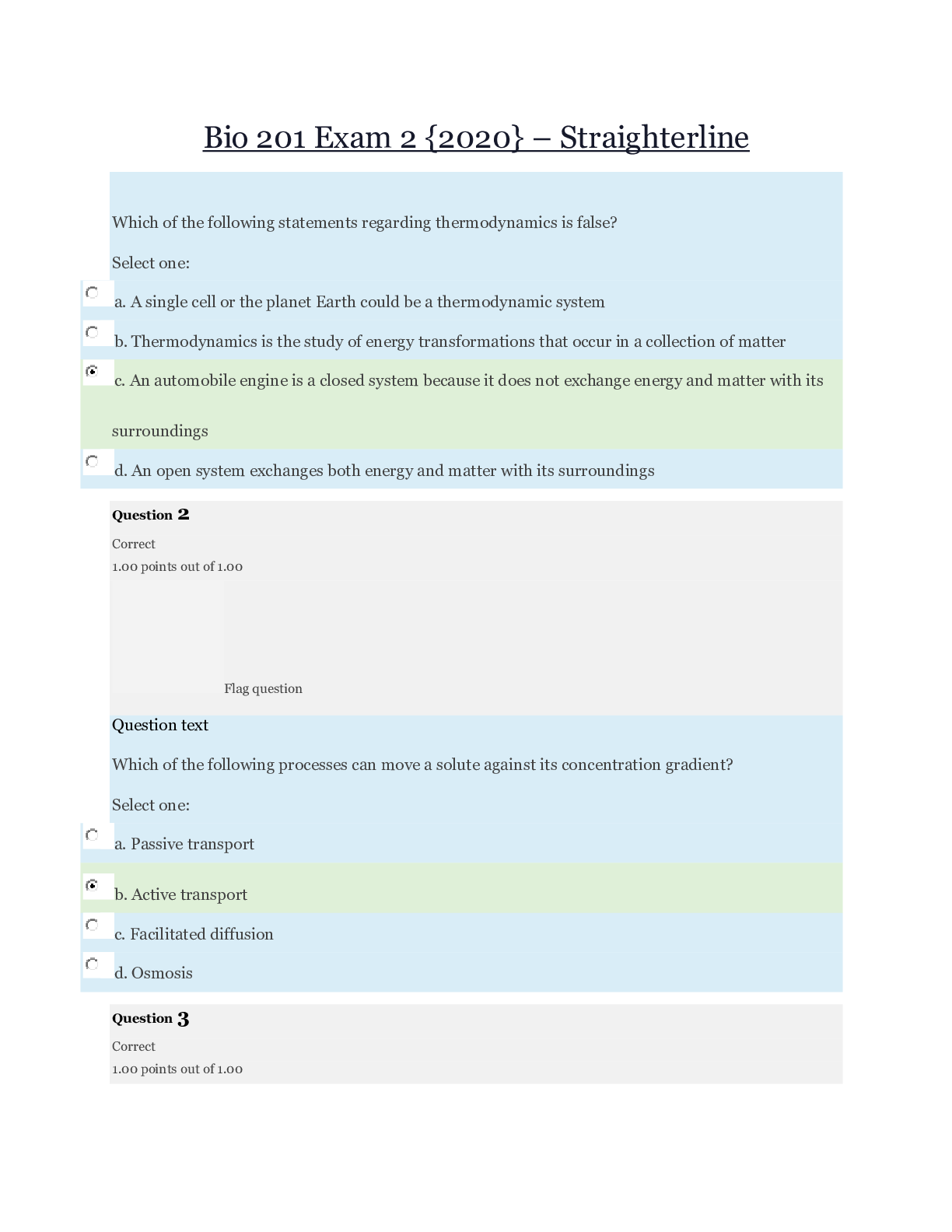
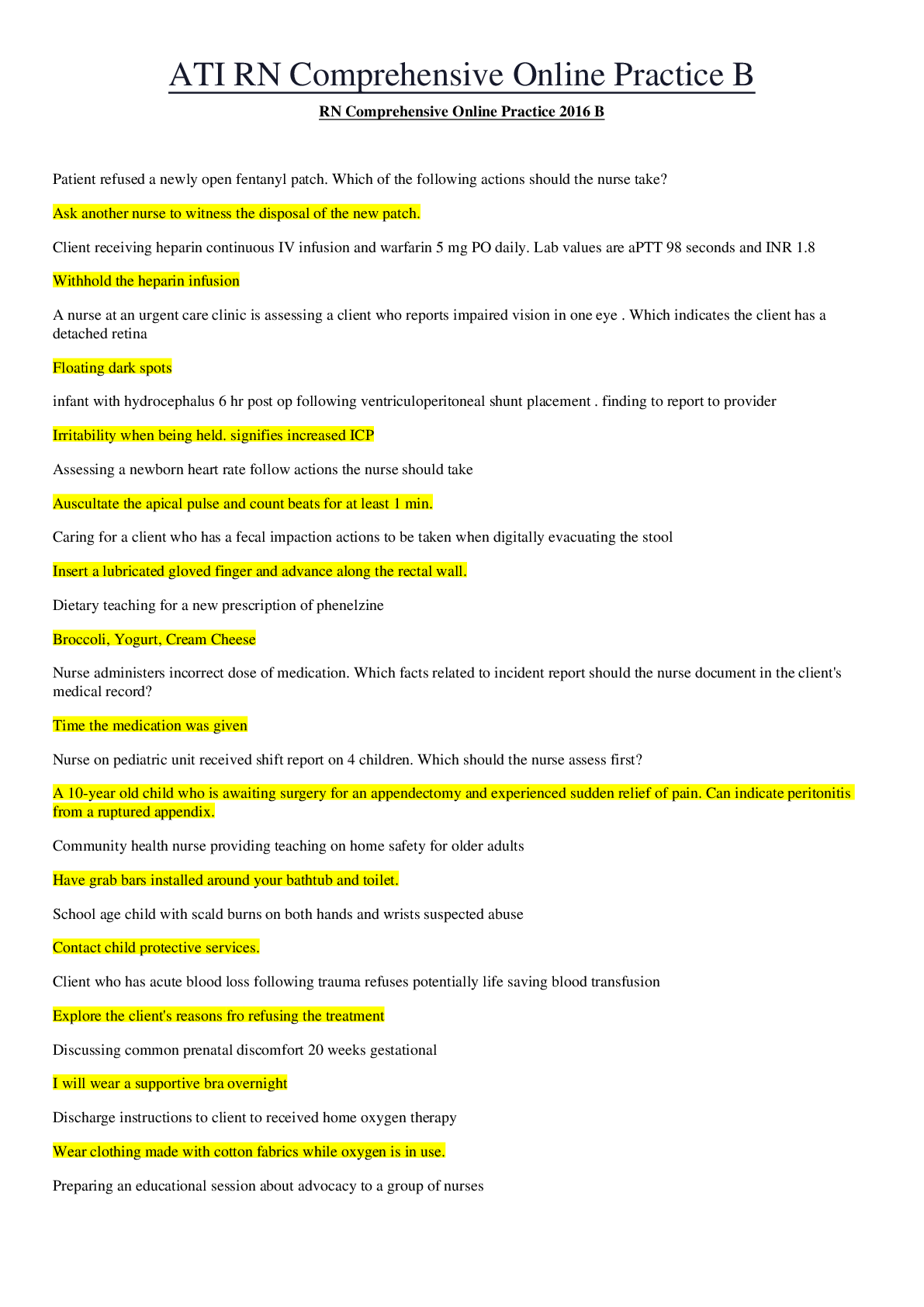
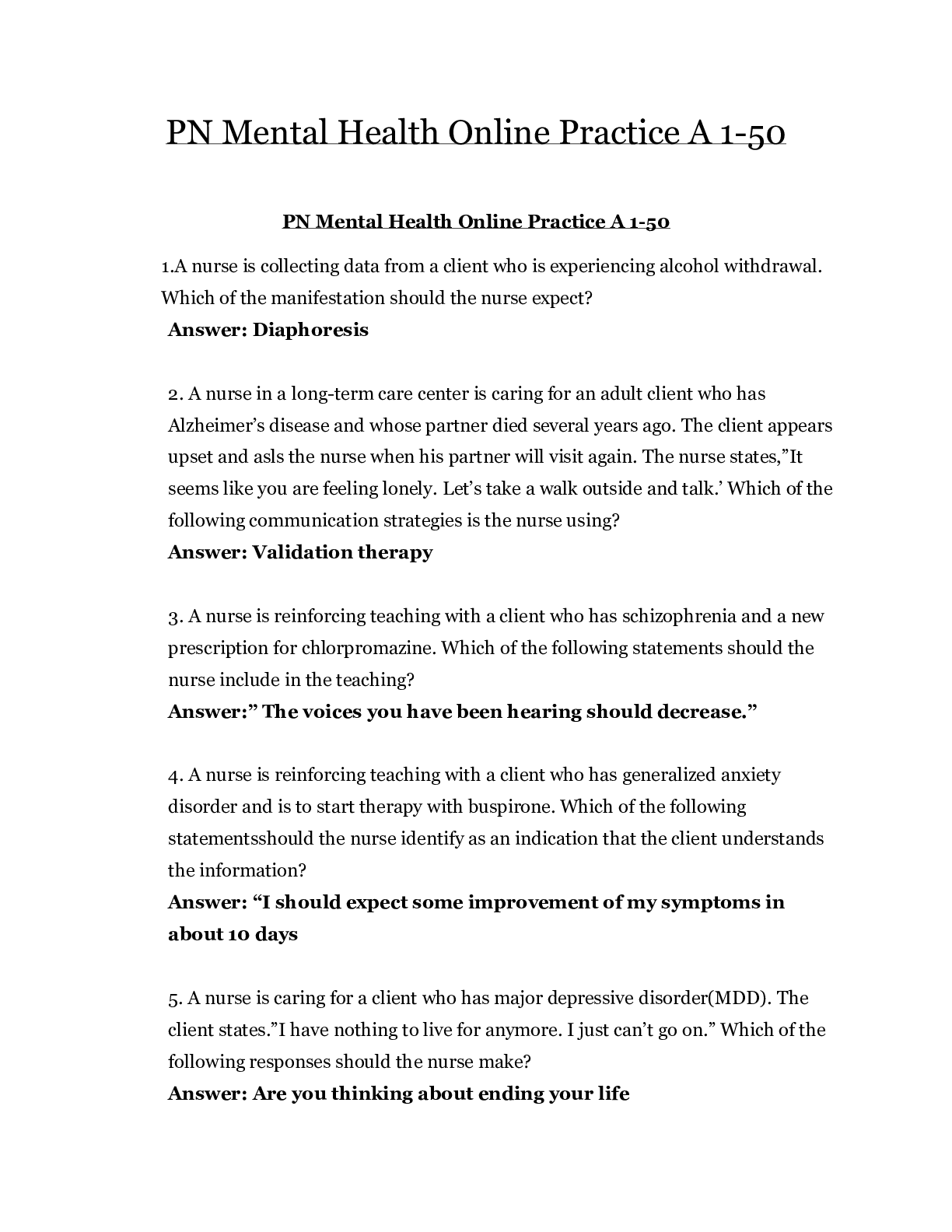
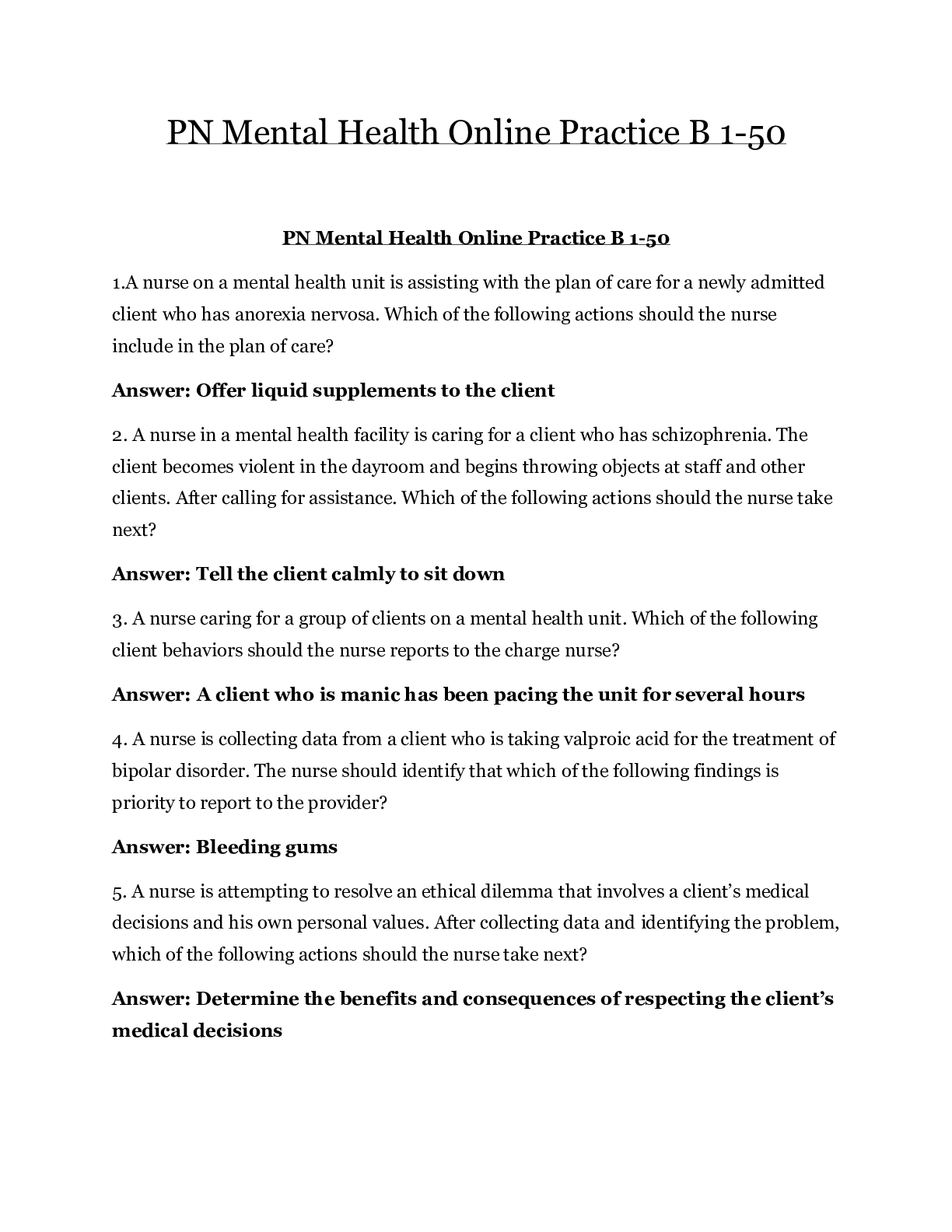
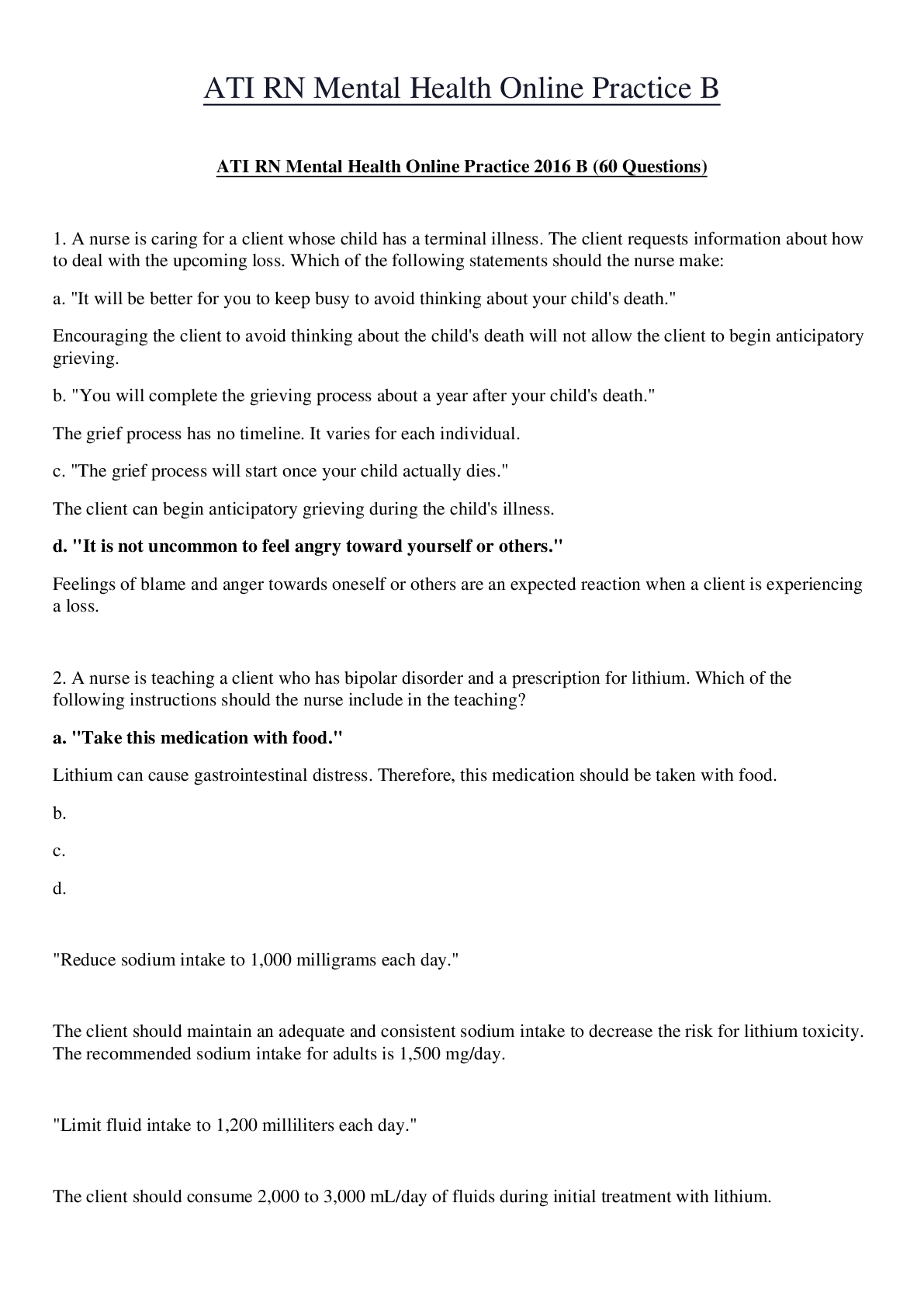
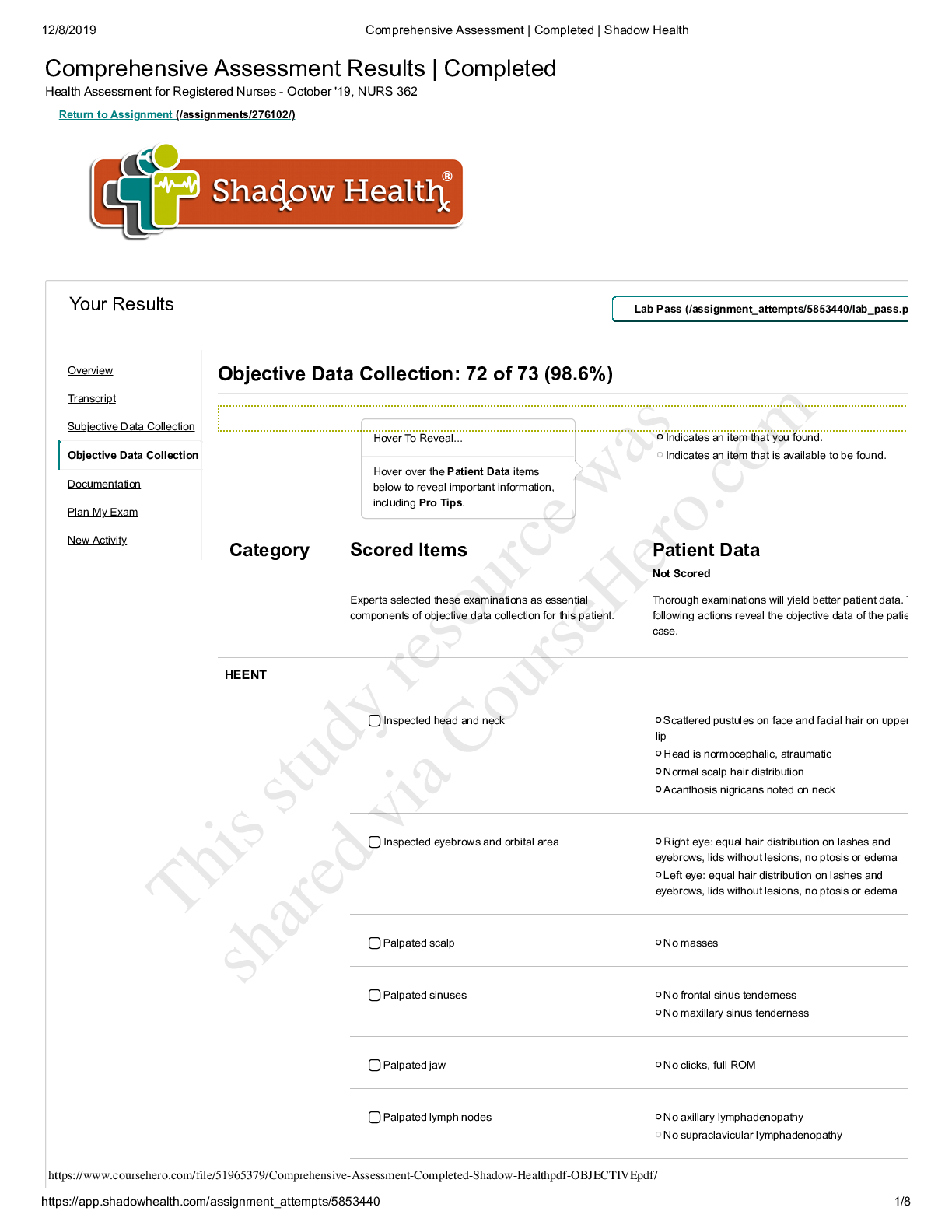


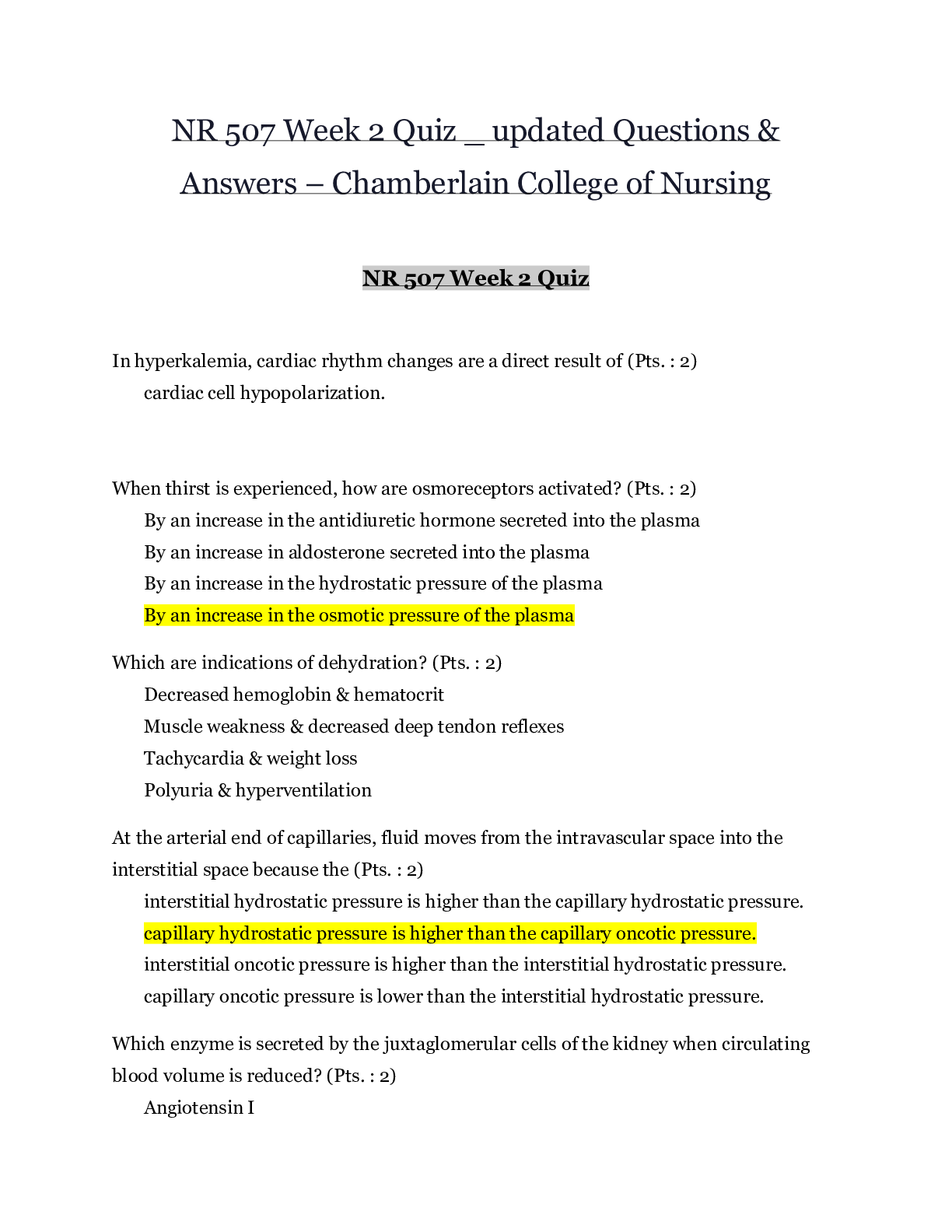
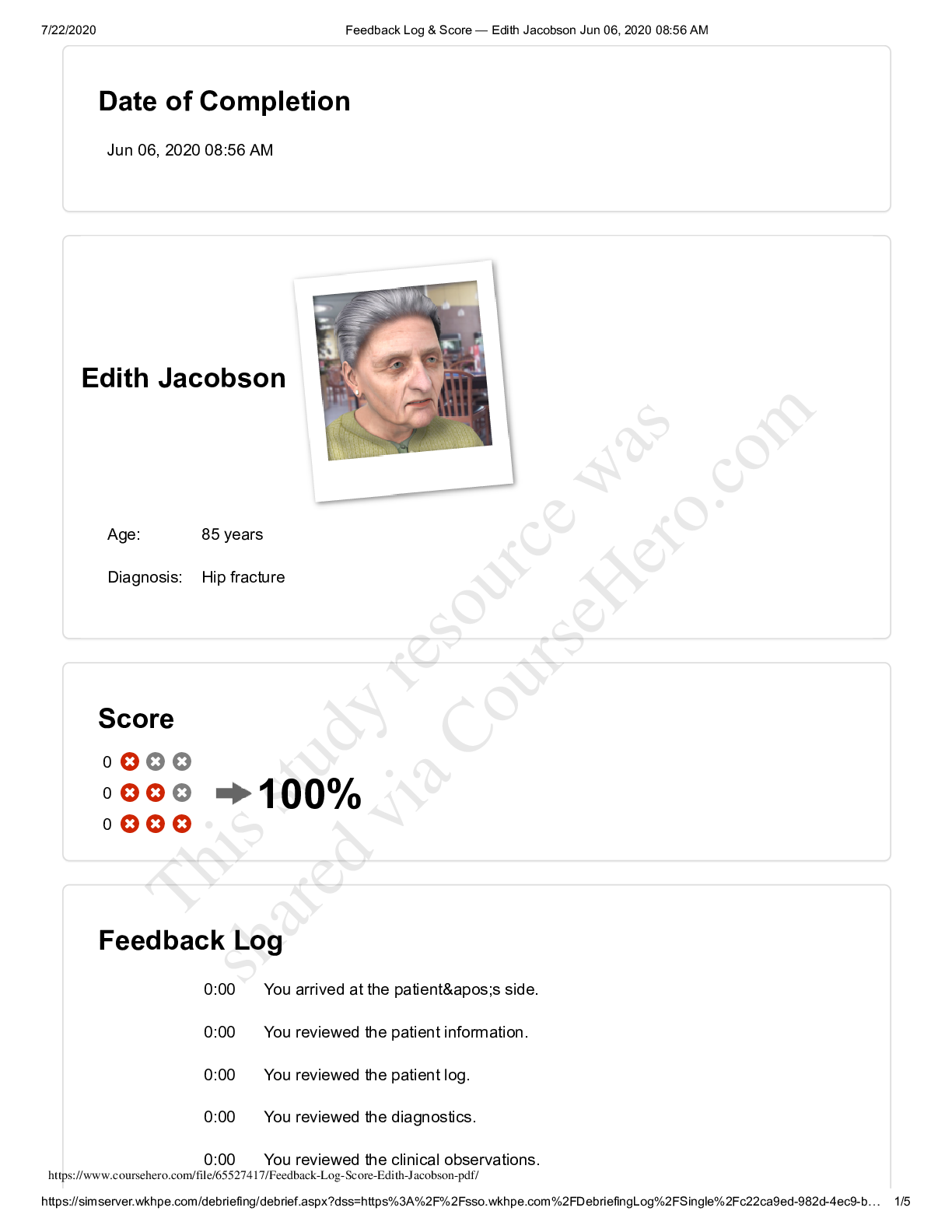


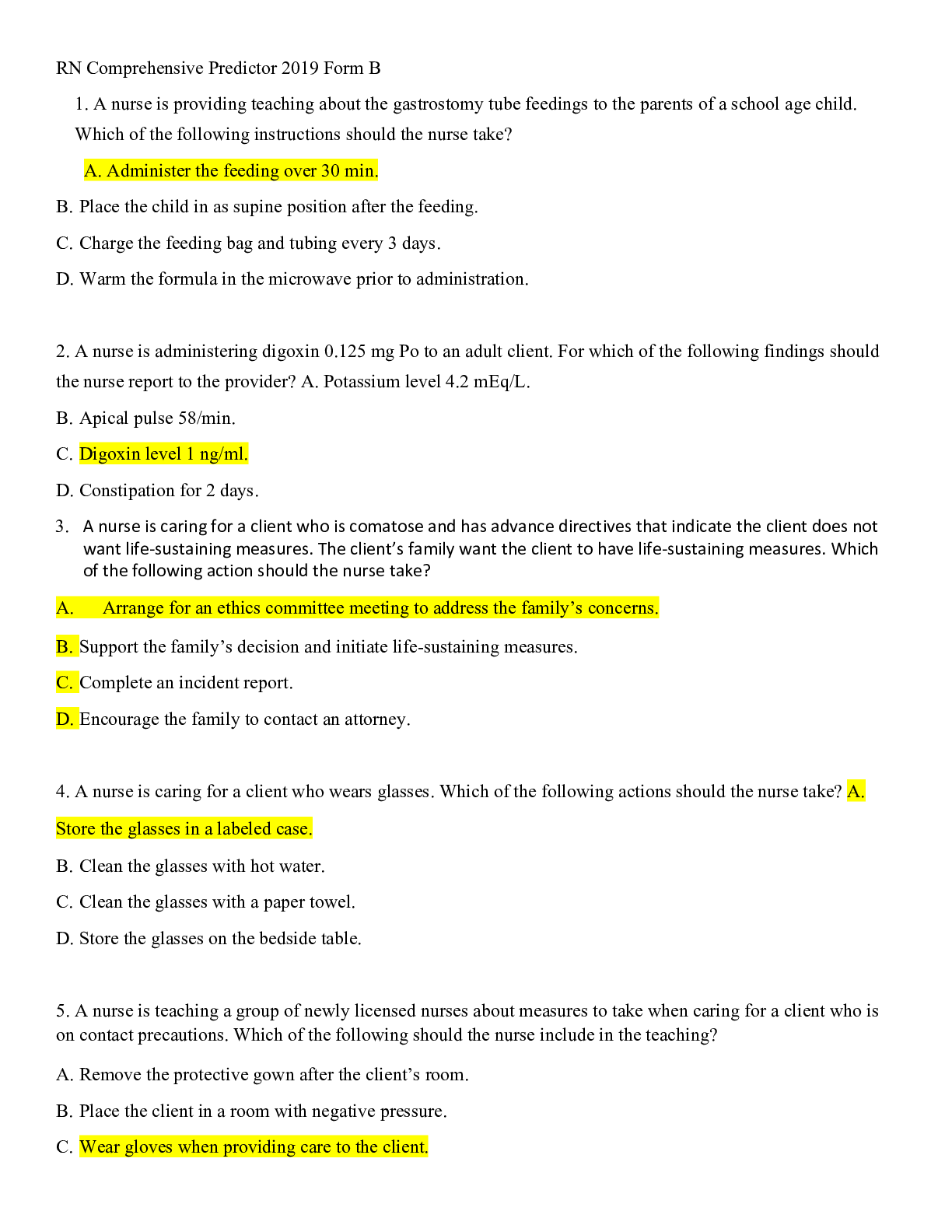
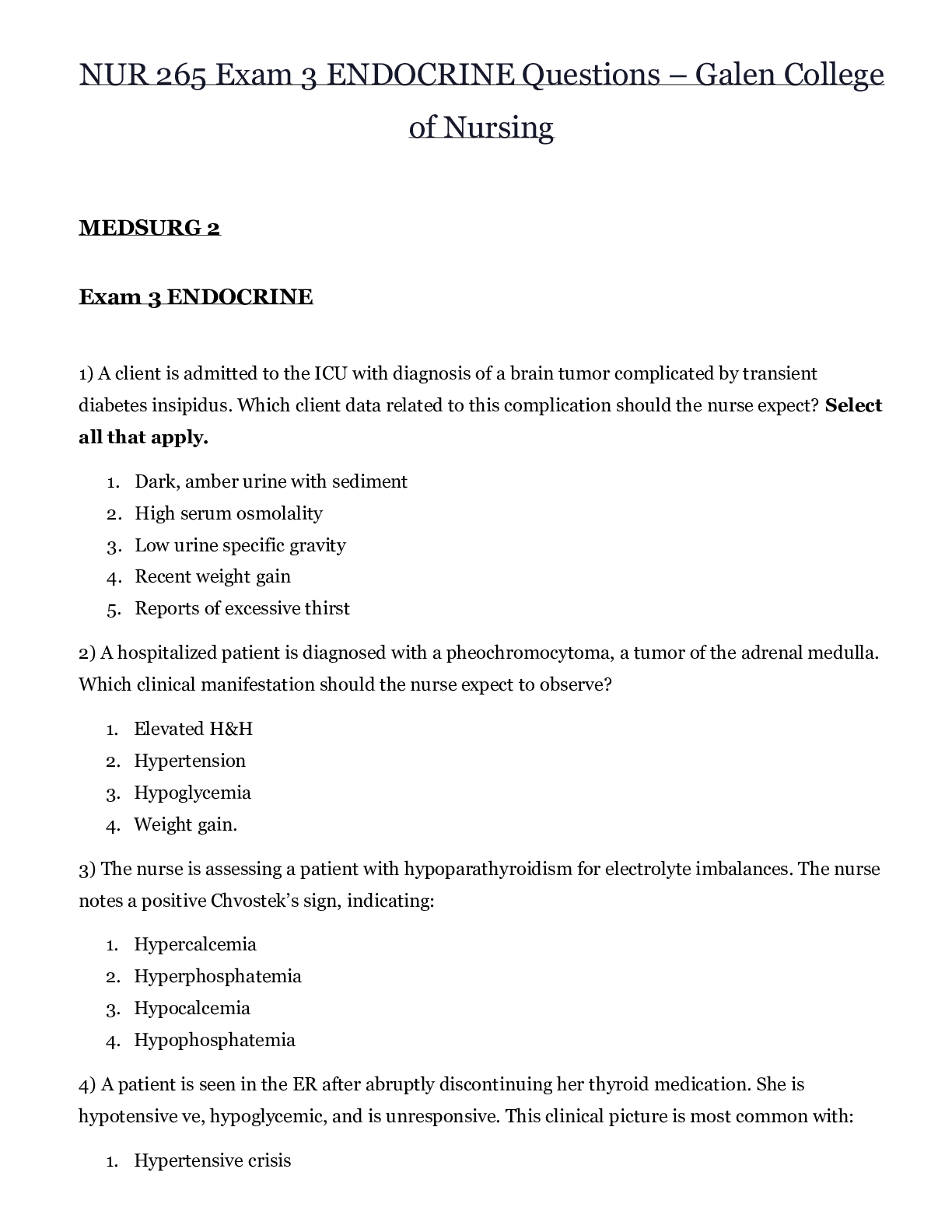
 – CHAMBERLAIN COLLEGE OF NURSING.png)
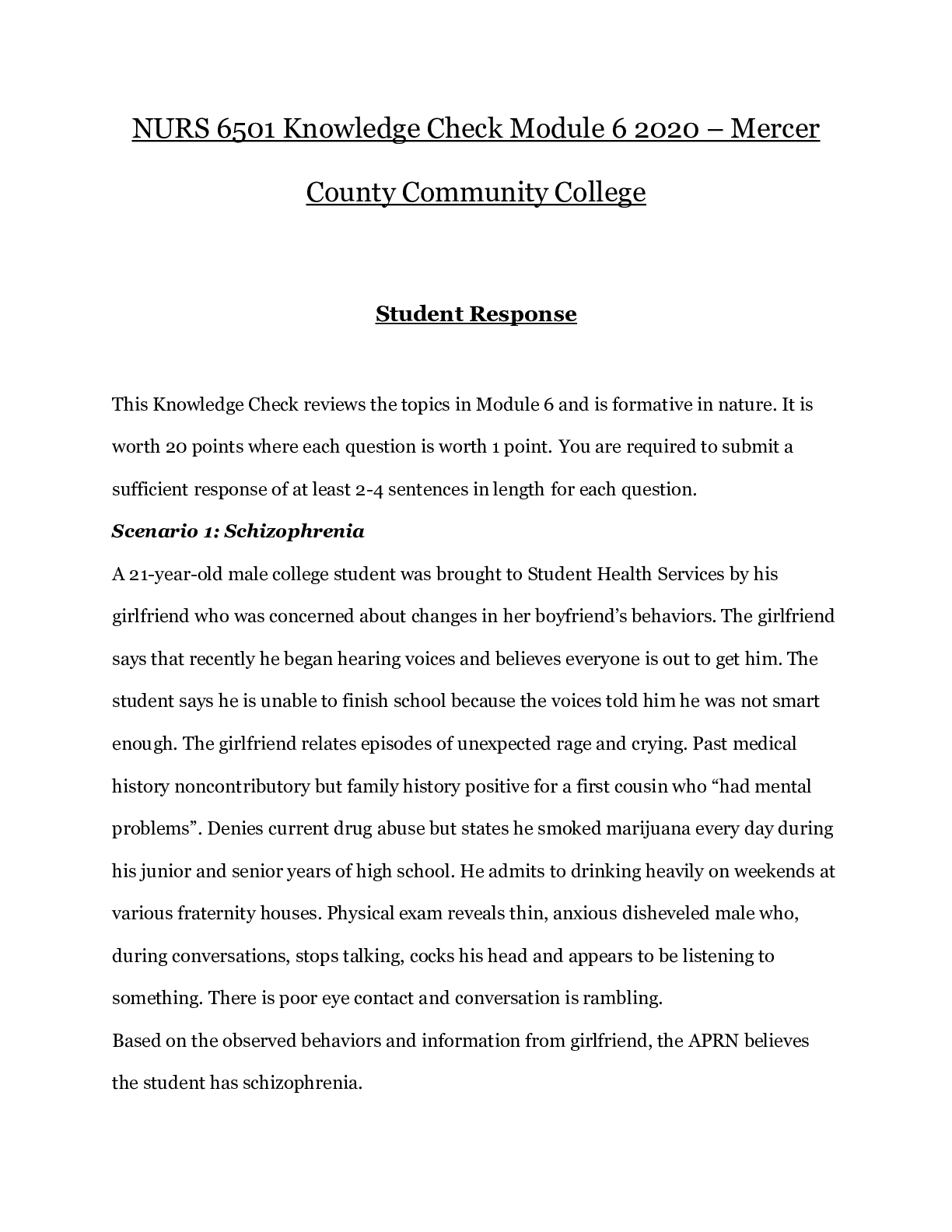
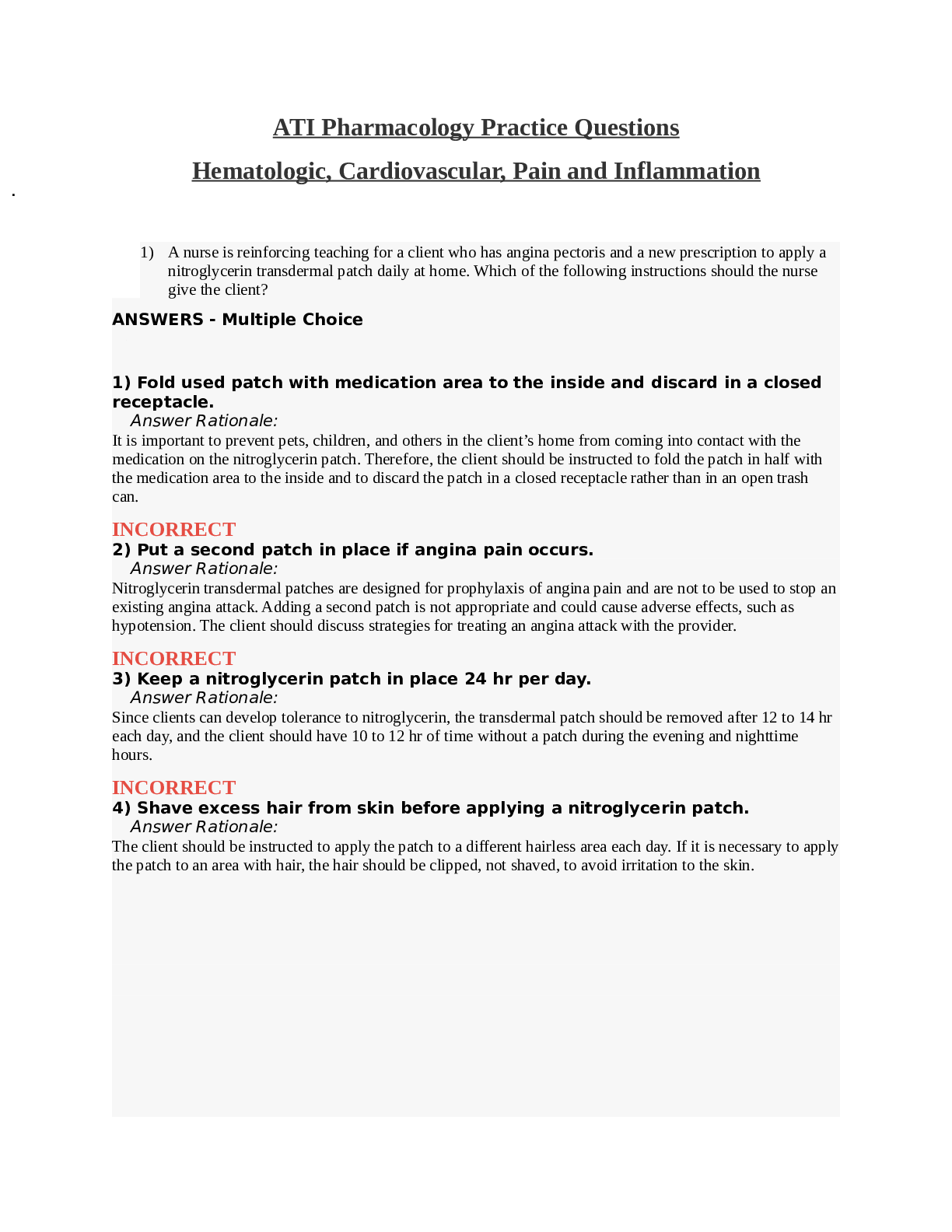
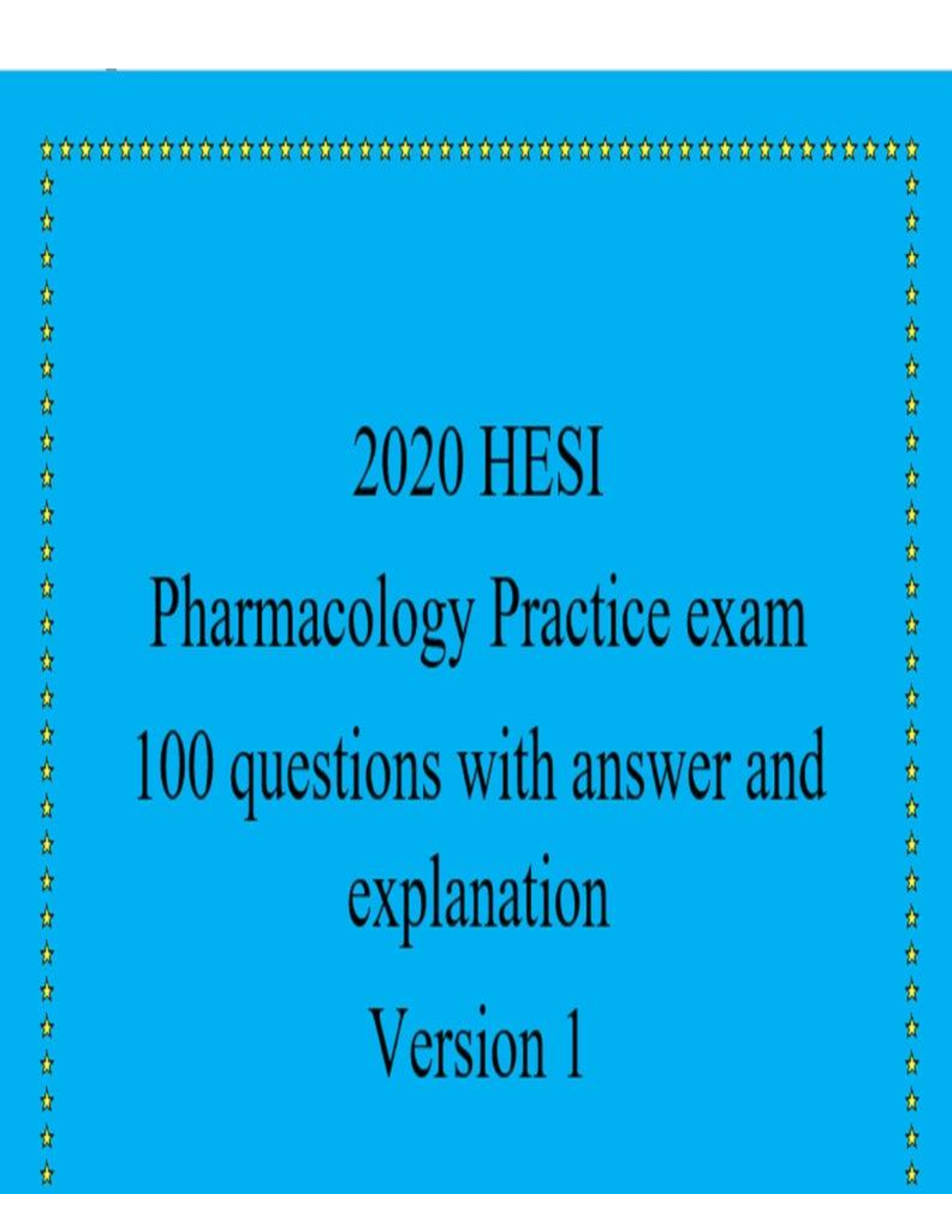
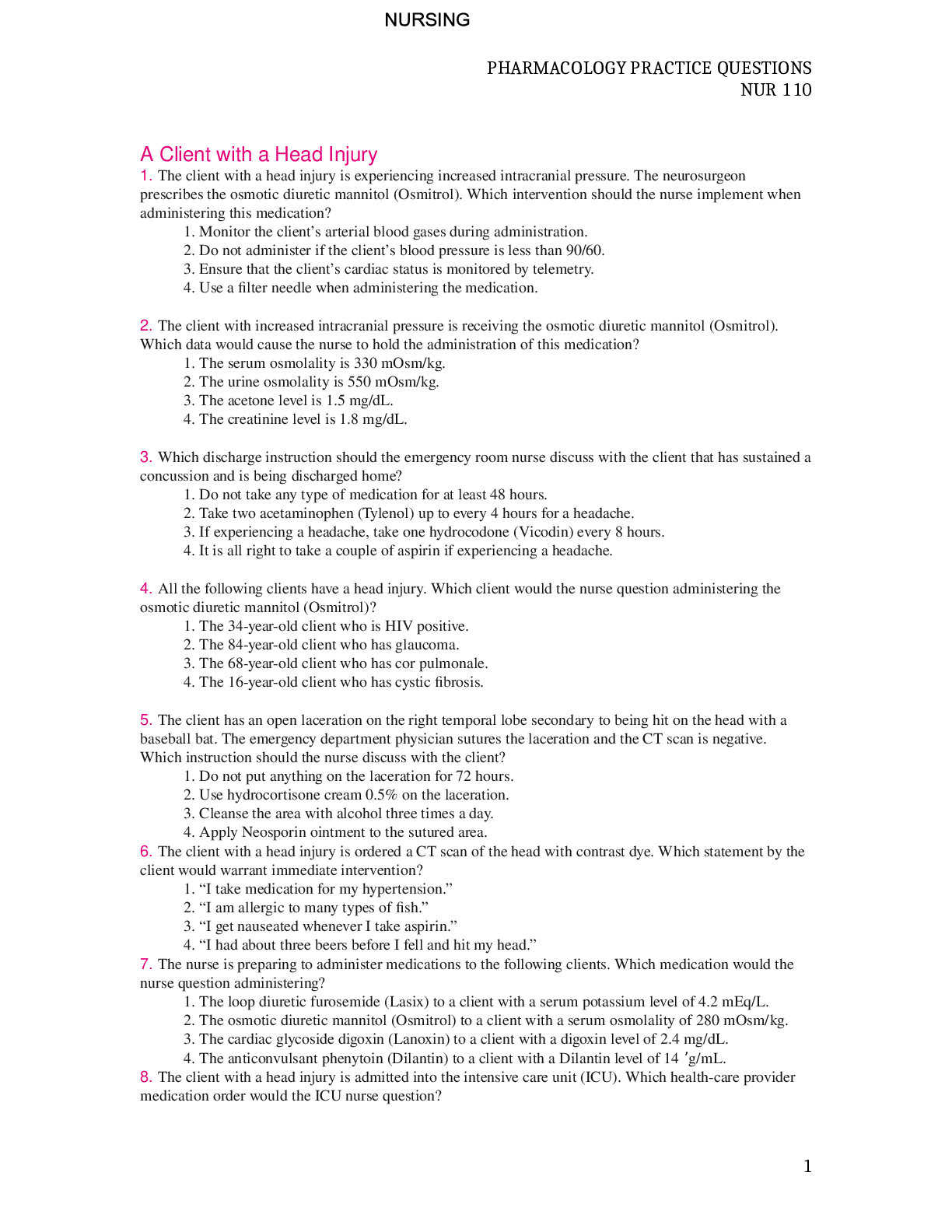
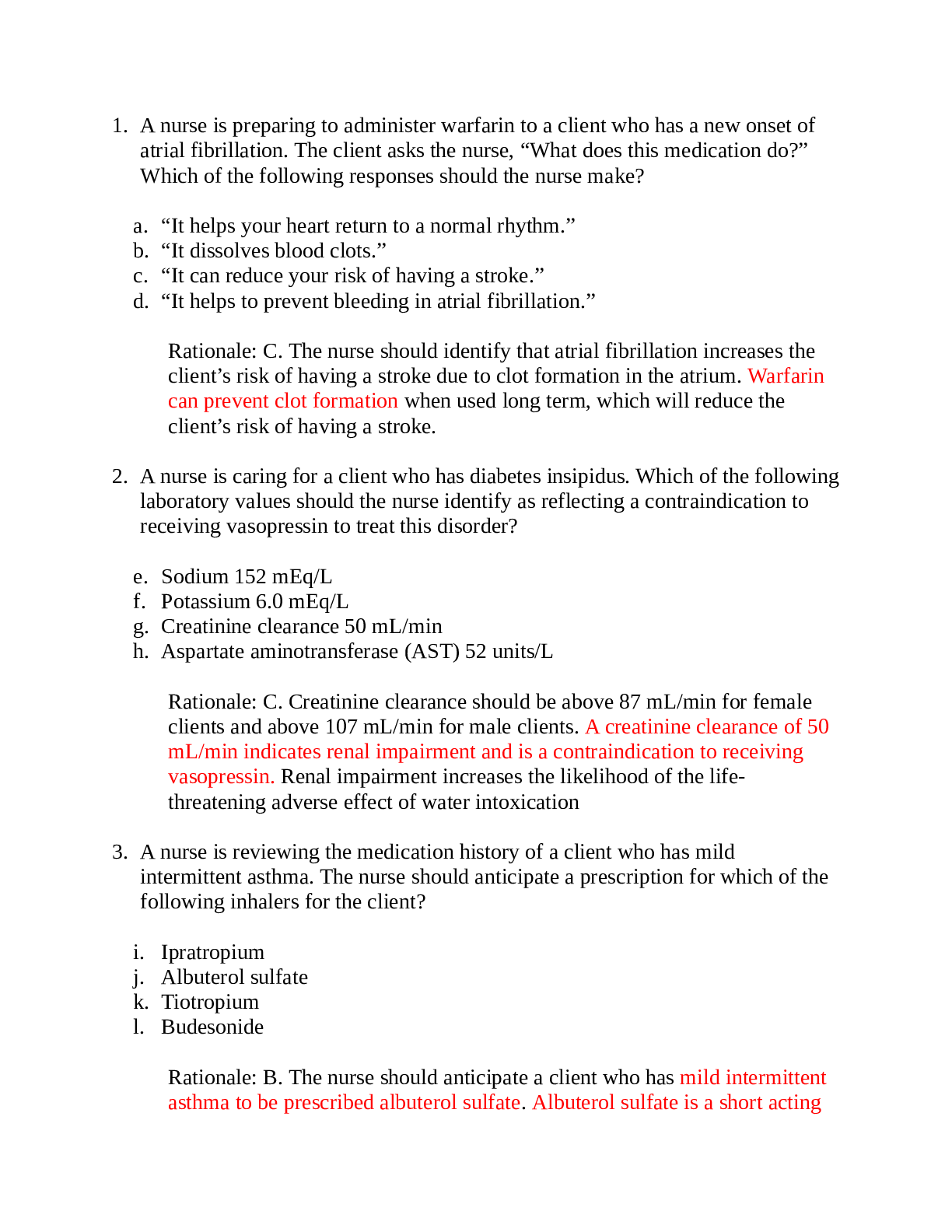
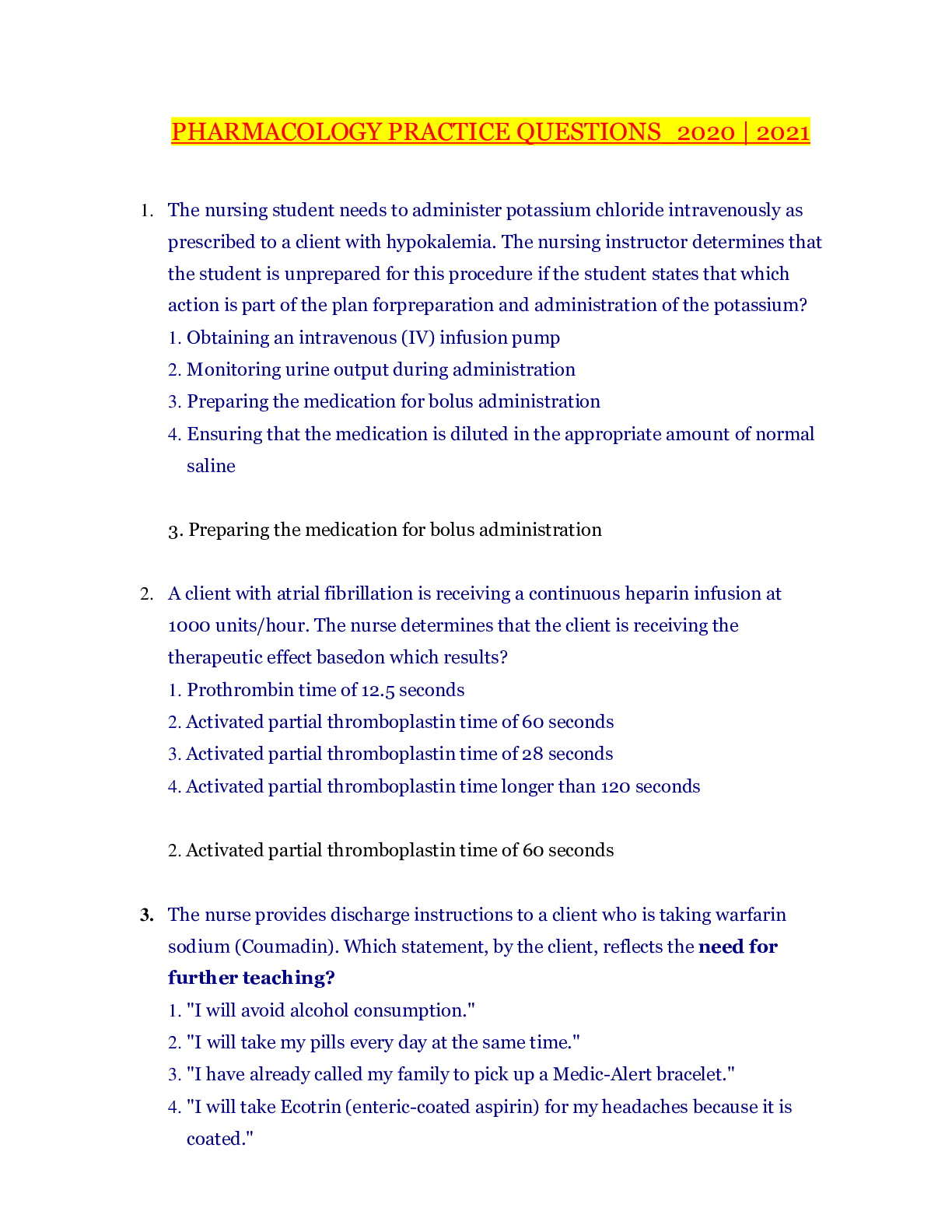
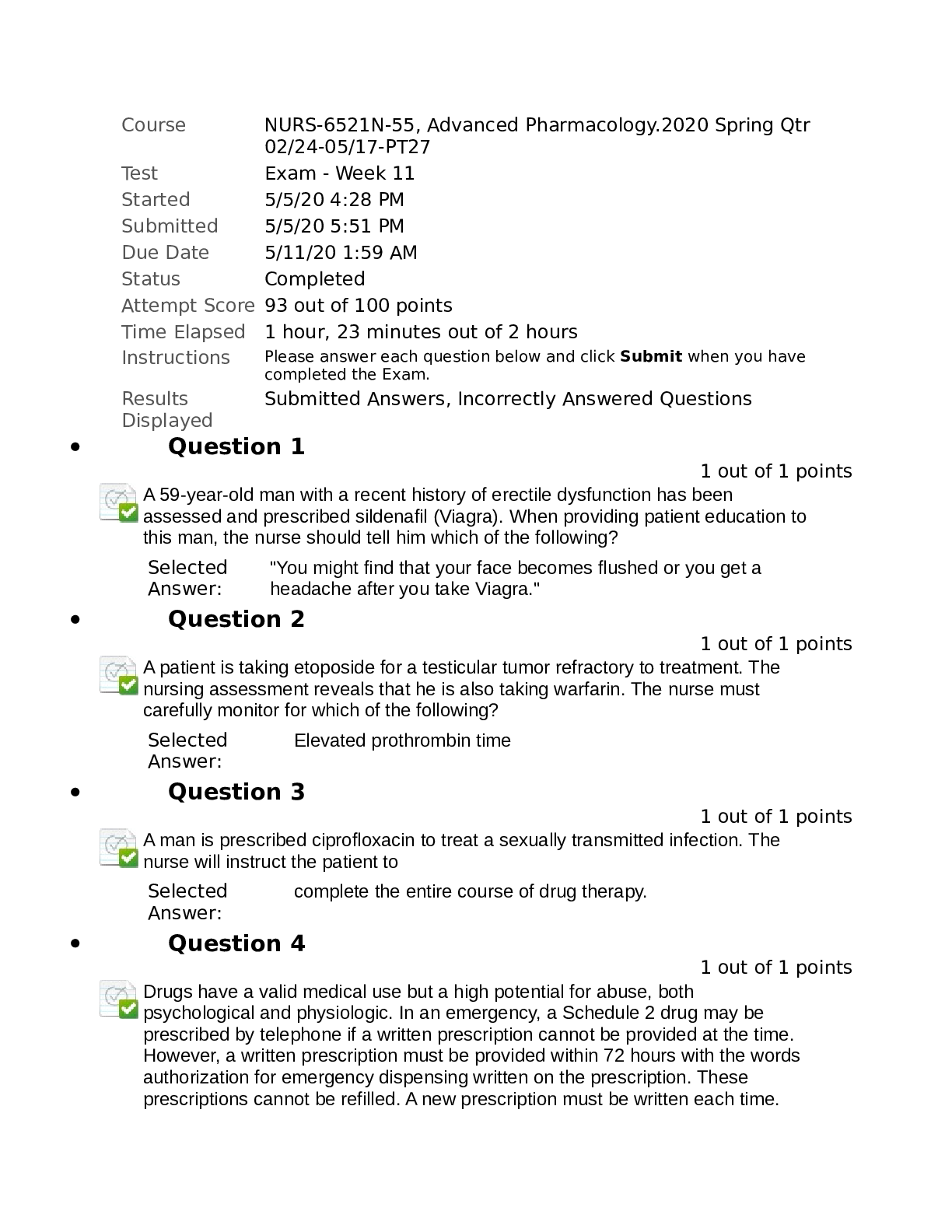
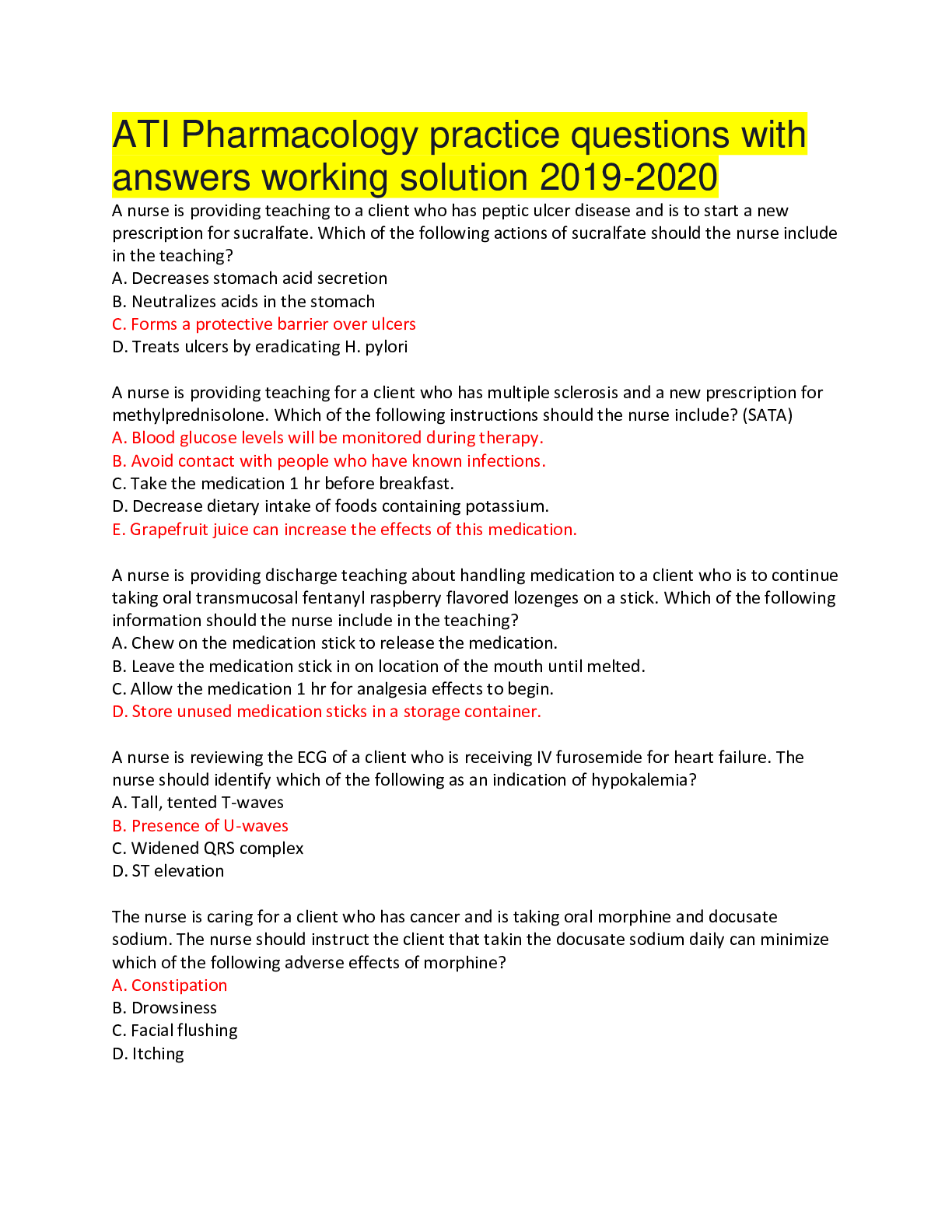
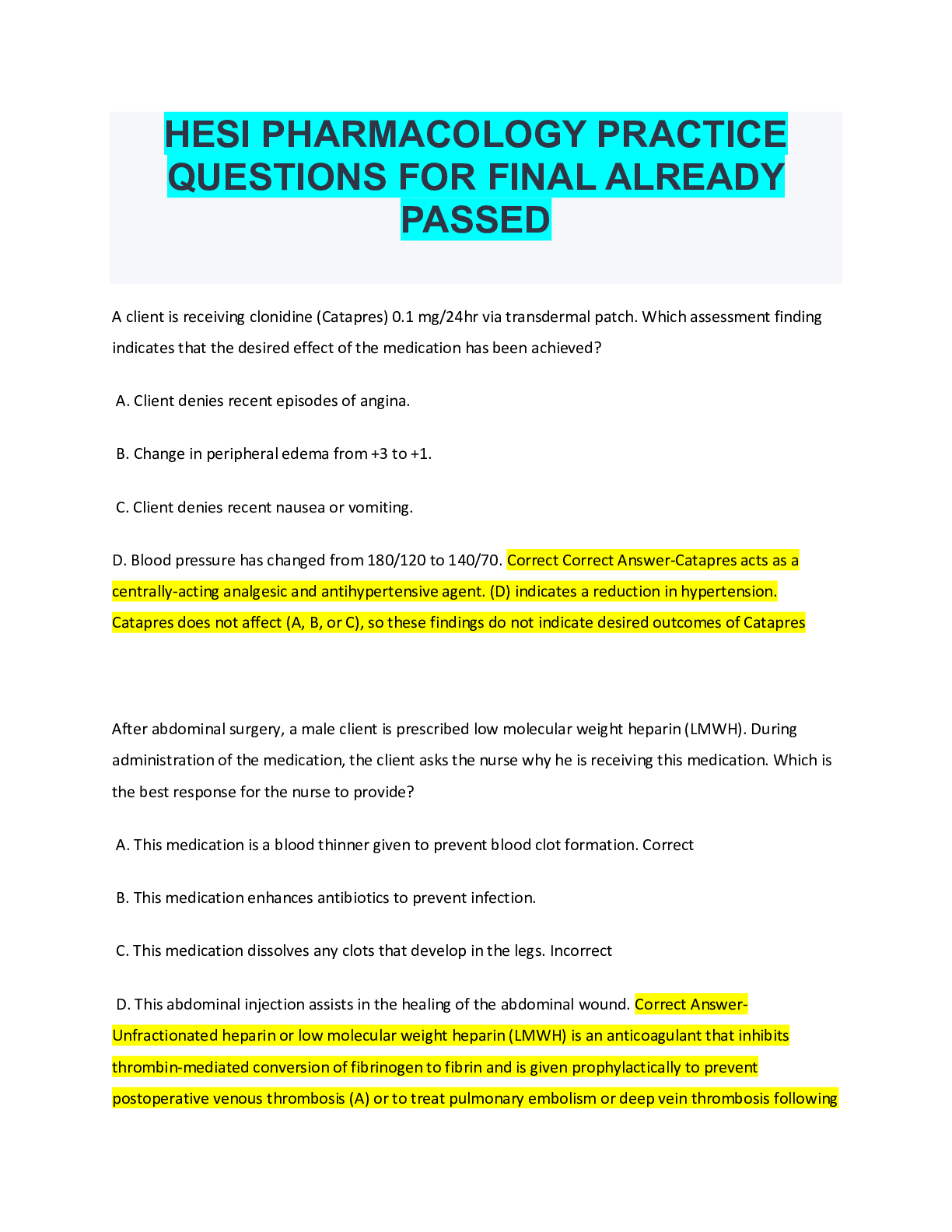
.png)
.png)
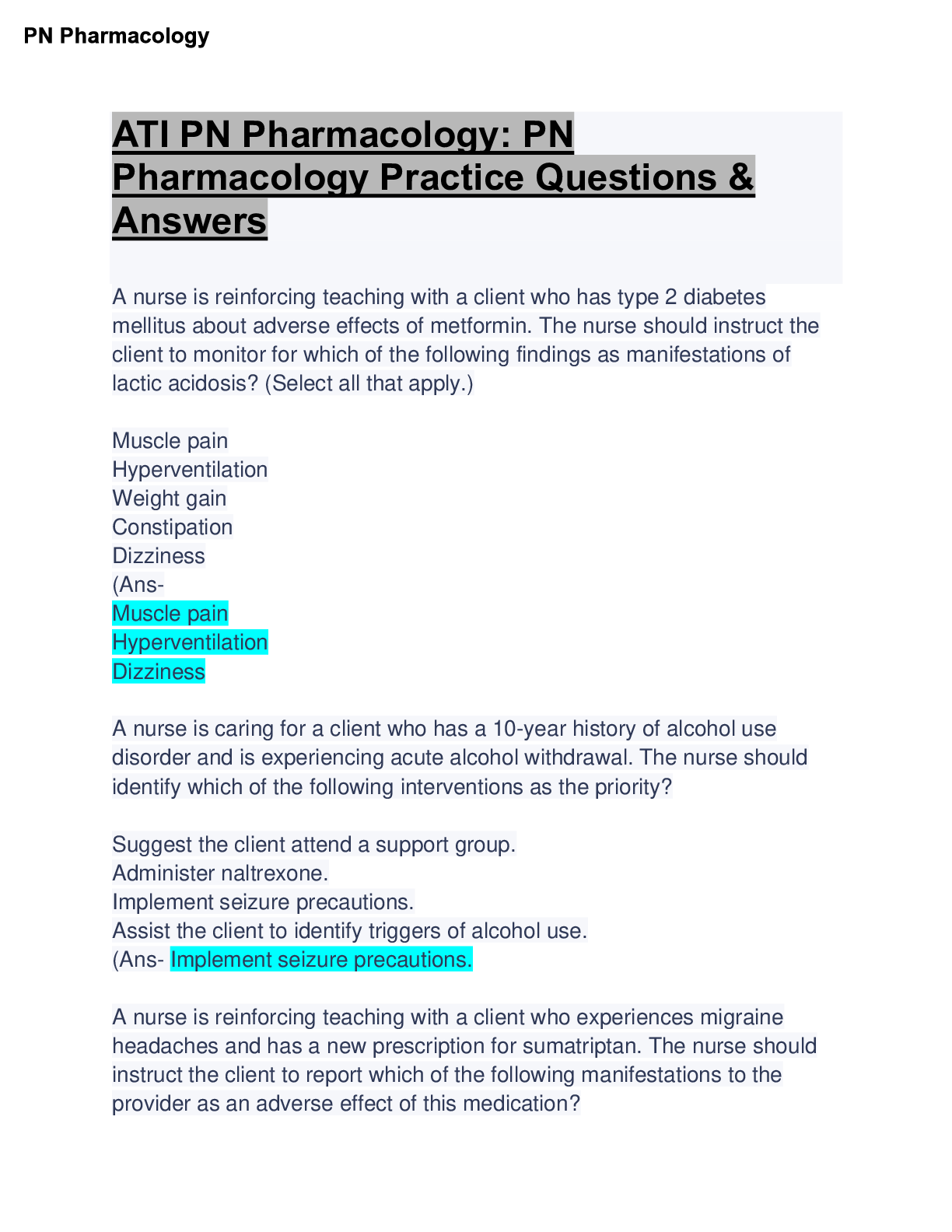
.png)
